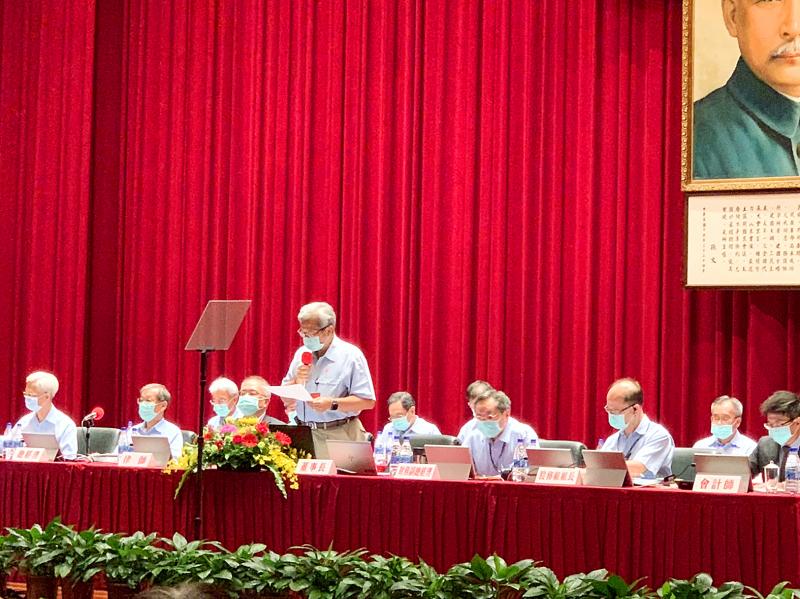China Steel Corp (CSC, 中鋼) yesterday said it aims to turn business around by the end of the year by improving post-pandemic market demand and new product developments.
“The start of the year was rough due to the COVID-19 pandemic, which affected the [global] economy and hampered investments... [We are facing] the largest economic crisis since World War II,” CSC chairman Wong Chao-tung (翁朝棟) told investors at the company’s annual meeting in Kaohsiung.
The pandemic-driven economic downturn is comparable to the effects of the 2003 SARS outbreak, the Sept. 11, 2001, attacks and the 2008 subprime mortgage crisis, Wong said.

Photo: Lin Chin-hua, Taipei Times
After reporting a 63.98 percent drop in net profit to NT$8.81 billion (US$297 million) amid a trade dispute between the US and China last year, the nation’s largest steelmaker reported net losses of NT$2.26 billion for last quarter.
Blaming the decline on plummeting prices and a saturated market due to mounting output from China and India, Wong said that CSC could no longer afford to simply rely on mass production of cheap steel.
“We need to set our focus on top-quality and high-precision steel products [in order to maintain growth],” he said.
Sales of such products are expected to contribute up to 20 percent of CSC’s revenue by 2024, he added.
Seeking to follow in the footsteps of European steelmakers, such as Austria’s Voestalpine AG and Sweden’s SSAB AB, CSC said it is concentrating on developing products for the wind power and electric vehicle industries.
The company late last year set up a marine engineering subsidiary, Sing Da Marine Structure Corp (興達海洋基礎), which specializes in producing jacket foundations used in wind turbines.
Seeking to secure a stronger foothold in Taiwan’s developing wind energy market, CSC’s board of directors yesterday approved increasing its investment by up to NT$680 million in the Chong Neng (中能) offshore wind farm project, which CSC is developing with Copenhagen Infrastructure Partners K/S.
In addition to adding to its portfolio an array of electrical steel sheets used in electric vehicles, Wong said the company has also successfully developed thin bulletproof steel plates for use in military vessels and armored vehicles.
With the pandemic slowly coming under control, Wong said he had high hopes for a rebound in market demand by the fourth quarter.
“Major steel companies have slashed production since the second quarter, including us, by 10 percent, in an attempt to stem losses,” Wong said.
In the meantime, the prices of raw materials such as iron ore and coal have risen, he added.
Citing recent price hikes from Chinese, Japanese and South Korean industry peers, Wong said market demand is showing signs of recovery.
“With the economy getting back on track ... hopefully we could turn around our losses by as early as September,” Wong said, pointing to recuperating downstream industries, which include machinery equipment and automobiles.

In Italy’s storied gold-making hubs, jewelers are reworking their designs to trim gold content as they race to blunt the effect of record prices and appeal to shoppers watching their budgets. Gold prices hit a record high on Thursday, surging near US$5,600 an ounce, more than double a year ago as geopolitical concerns and jitters over trade pushed investors toward the safe-haven asset. The rally is putting undue pressure on small artisans as they face mounting demands from customers, including international brands, to produce cheaper items, from signature pieces to wedding rings, according to interviews with four independent jewelers in Italy’s main

Japanese Prime Minister Sanae Takaichi has talked up the benefits of a weaker yen in a campaign speech, adopting a tone at odds with her finance ministry, which has refused to rule out any options to counter excessive foreign exchange volatility. Takaichi later softened her stance, saying she did not have a preference for the yen’s direction. “People say the weak yen is bad right now, but for export industries, it’s a major opportunity,” Takaichi said on Saturday at a rally for Liberal Democratic Party candidate Daishiro Yamagiwa in Kanagawa Prefecture ahead of a snap election on Sunday. “Whether it’s selling food or

CONCERNS: Tech companies investing in AI businesses that purchase their products have raised questions among investors that they are artificially propping up demand Nvidia Corp chief executive officer Jensen Huang (黃仁勳) on Saturday said that the company would be participating in OpenAI’s latest funding round, describing it as potentially “the largest investment we’ve ever made.” “We will invest a great deal of money,” Huang told reporters while visiting Taipei. “I believe in OpenAI. The work that they do is incredible. They’re one of the most consequential companies of our time.” Huang did not say exactly how much Nvidia might contribute, but described the investment as “huge.” “Let Sam announce how much he’s going to raise — it’s for him to decide,” Huang said, referring to OpenAI

The global server market is expected to grow 12.8 percent annually this year, with artificial intelligence (AI) servers projected to account for 16.5 percent, driven by continued investment in AI infrastructure by major cloud service providers (CSPs), market researcher TrendForce Corp (集邦科技) said yesterday. Global AI server shipments this year are expected to increase 28 percent year-on-year to more than 2.7 million units, driven by sustained demand from CSPs and government sovereign cloud projects, TrendForce analyst Frank Kung (龔明德) told the Taipei Times. Demand for GPU-based AI servers, including Nvidia Corp’s GB and Vera Rubin rack systems, is expected to remain high,